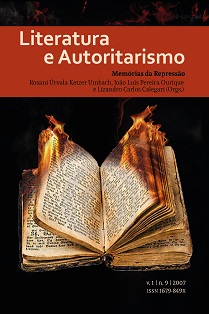Amnesty and (in)justice in Brazil: the duty of justice and impunity
DOI:
https://doi.org/10.5902/1679849X73980Keywords:
Amnesty, Brazilian civil-military dictatorship, Memory and justice, Memory and law, Perlaboration of the pastAbstract
The article deals with the aporias implied in the memory of the Brazilian civil-military dictatorship of 1964-1985. It analyzes the difference between the initial concept implicit in the claims for amnesty on the part of the opposition and, on the other hand, the 1979 amnesty, imposed by the agents of the dictatorship. This amnesty has implied, until today, impunity for crimes committed by state terrorism. The text presents the existing need in the work of memory after exceptional regimes to bring the truth to light as well as to carry out a "duty of justice". Only through this process can society try to build democracy and the rule of law. The obliteration of memory and the impediment of the work of justice lead society to remain trapped in its past and to repeat the same violent structure. The text also analyzes the verses of the song "Angélica" by Chico Buarque as a way of working with the traumatic memory of the dictatorship.
Downloads
References
AGAMBEN, Giorgio. Estado de exceção, trad. I. Poleti, São Paulo: Boitempo, 2004.
AMÉRY, Jean. "Die Tortur", in: Werke, vol. II, Stuttgart: Klett-Cotta, 2002.
BARTOV, Omer, GROSSMANN, Anita, NOLAN, Mary. "Introdução", in: BARTOV, Omer, GROSSMANN, Anita, NOLAN, Mary (orgs.) Crimes de guerra: culpa e negação no Século XX, trad. R. Rezende, Rio de Janeiro: Difel, 2005.
BENJAMIN, Walter. "Zur Kritik der Gewalt", in: Gesammelte Schriften, org. por R. Tiedemann und H. Schweppenhäuser, Frankfurt a.M.: Suhrkamp, vol. II: Aufsätze, Essays, Vorträge, 1974. Pp. 179-203.
BICUDO, Hélio. "Lei da Anistia e crimes conexos" [Folha de S.Paulo 6.12.1995, p. 3] in: Janaína Teles (org.), Mortos e desaparecidos políticos: Reparação ou impunidade? , São Paulo: Humanitas, segunda edição 2001. 85-87.
CELAN, Paul. Sete rosas mais tarde. Antologia poética, trad. J. Barrento, edição bilíngüe, segunda edição, Lisboa: Cotovia, 1996.
COMPARATO, Fábio Konder. "A responsabilidade do Estado Brasileiro na questão dos desaparecidos durante o regime militar" [1995], in: Janaína Teles (org.), Mortos e desaparecidos políticos: Reparação ou impunidade? , São Paulo: Humanitas, 2ª ed., 2001. p. 55-63.
DALLARI, Dalmo de Abreu. "Crimes sem anistia" [Folha de S.Paulo, 18.12.1992, p.3], in: Janaína Teles (org.), Mortos e desaparecidos políticos: Reparação ou impunidade? São Paulo: Humanitas, 2ª ed., 2001. p. 31-33.
DERRIDA, Jacques. Force de Loi, Paris: Galilée, 1994.
DERRIDA, Jacques. Pardoner: l'impardonable et l'imprescriptible, Paris: L'Herne, 2005.
DORFMAN, Ariel. A morte e a donzela, trad. Marcos Renaux, Rio de Janeiro: Paz e Terra, 1992.
ÉSQUILO, Oréstia. Agamêmnon, Coéforas, Eumênides, trad. Mário da Gama Kury, Rio de Janeiro: Jorge Zahar, 6a. ed., 2003.
FREUD, Sigmund. "Recordar, repetir e perlaborar" [1914], in: Obras psicológicas completas, Standard ed., Rio de Janeiro: Imago, XII, p. 159-172.
IDOETA, Carlos Alberto. "Verdade e reconciliação" [1995], in: Janaína Teles (org.), Mortos e desaparecidos políticos: Reparação ou impunidade? , São Paulo: Humanitas, 2ª ed., 2001. p. 73-76.
MARTINS FILHO, João Roberto. "A memória militar sobre a tortura", in: Janaína Teles (org.), Mortos e desaparecidos políticos: Reparação ou impunidade? , São Paulo: Humanitas, 2ª ed., 2001. p. 109-115.
NEHRING, Marta. "Carta aos torturadores" [Folha de S.Paulo, 31.03.1999, p. 3], in: Janaína Teles (org.), Mortos e desaparecidos políticos: Reparação ou impunidade? , São Paulo: Humanitas, 2ª ed., 2001. p. 125-127.
NIETZSCHE, F. Jenseits von Gut und Böse, Zur Genealogie der Moral. Eine Streitschrift, in: Kritische Studienausgabe, org. G. Colli e M. Montinari, München: DTV/ Berlin-New York: Walter de Gruyter, vol. 5, 1988.
NIETZSCHE, F. Genealogia da Moral. Uma polêmica, trad. Paulo C. Souza, S. Paulo: Companhia das Letras, 1998.
REIS FILHO, Daniel Aarão. "A anistia recíproca no Brasil ou a arte de reconstruir a História" [Jornal da Tarde, São Paulo, 28.08.1999, p. 3], in: Janaína Teles (org.), Mortos e desaparecidos políticos: Reparação ou impunidade? São Paulo: Humanitas, 2ª ed., 2001. p. 131-137.
Remate de Males. Revista do Departamento de Teoria Literária do IEL, UNICAMP, 26.1, janeiro-junho/2006. Dossiê "Literatura como uma arte da memória".
SELIGMANN-SILVA, Márcio. "Walter Benjamin: o Estado de Exceção entre o político e o estético." In; outra travessia. Revista de Literatura, n. 5, 2º. semestre de 2005a. Curso de Pós-Graduação em Literatura. Centro de Comunicação e Expressão. UFSC, p. 25-38.
SELIGMANN-SILVA, Márcio. "Literatura e trauma: um novo paradigma", in: M. Seligmann-Silva, O local da diferença. Ensaios sobre memória, arte, literatura e tradução, São Paulo: Editora 34, 2005b. p. 63-80.
Downloads
Published
How to Cite
Issue
Section
License
DECLARAÇÃO DE ORIGINALIDADE E EXCLUSIVIDADE E CESSÃO DE DIREITOS AUTORAIS
Declaro que o presente artigo é original e não foi submetido à publicação em qualquer outro periódico nacional ou internacional, quer seja em parte ou na íntegra. Declaro, ainda, que após publicado pela Literatura e Autoritarismo, ele jamais será submetido a outro periódico. Também tenho ciência que a submissão dos originais à Literatura e Autoritarismo implica transferência dos direitos autorais da publicação digital. A não observância desse compromisso submeterá o infrator a sanções e penas previstas na Lei de Proteção de Direitos Autorais (nº 9610, de 19/02/98).






